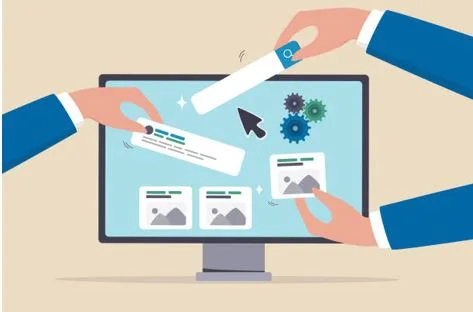How Mobile Apps Are Making U.S. Cities Smarter
Urban areas are slowly turning into smart cities due to the innovation in the latest technologies. From communication networks to software development and advanced user interfaces to the internet of things (IoT), everything contributes to the making of smart urban ecosystems.
According to MarketsandMarkets, the smart cities market size is expected to reach USD 1,445.6 billion by 2030 at 15.6% of CAGR. Artificial intelligence (AI) and development of mobile apps are some of the important integrations that helped urban regions undergo a profound transformation.
Want to find out how building the right apps drive innovation in creating future-ready cities? This blog discusses how mobile app design and development paves the path for modern infrastructure, improving the quality of life of U.S citizens.
What is the concept of smart cities?
A smart city is a region that leverages digital technologies and sensors to collect electronic data for managing various resources, assets, and services. The collected data comes from different sources, including mobile devices, IoT-enabled platforms, citizen services, and other online systems.
Urban areas are generally transformed into smart cities with the help of the latest technologies. Local governments or concerned authorities use data-driven insights to plan, implement, and optimize diverse city services efficiently.
Smart cities are designed to manage traffic congestion, monitor regular energy usage, and coordinate emergency or rescue operations during critical situations. Data collected from internet-enabled devices is utilized in multiple ways to benefit the local population and improve urban living.
In areas like waste management, hospitals, public information systems, crime detection, schools, community services, power plants, and other utilities, this data provides valuable insights. It helps authorities ensure efficient city operations, sustainability, and a better quality of life for residents.
Impact of mobile apps behind smart city evolution
The following aspects highlight why smart city builders hire a developer to ensure seamless coordination and communication with users through mobile applications.
-
Next-gen transportation
Traffic congestion and inadequate public transportation systems are common issues, which are now addressed with mobile software development. A study estimates that many cities can cut travel times by 15-20% by using smart mobility applications.
Uber and Lyft are apps that have revolutionized transportation by providing convenient and on-demand rides with just a single tap. Public transportation apps offer real-time updates on bus and train schedules, helping commuters plan their journeys more efficiently across the U.S.
According to another survey, introducing a mobile fare payment app made transit more efficient. About 75% of riders reported that it reduced their ticket-purchase time.
-
Sustainable energy management
Smart cities reduce energy consumption and promote sustainability through a custom software solution. Developing mobile apps makes it easier to achieve these goals.
Thanks to apps that connect to smart meters, residents can now monitor their energy usage in real-time. These apps also offer insights on how to conserve energy, ultimately reducing utility bills and environmental impact.
Waste management has become more accessible for U.S. residents and business owners. According to a study, the nation’s progress towards a smart city must fulfil basic things such as processing waste. The approach for smart energy management includes rethinking, reducing, recovering, reusing and recycling.
-
Enhanced healthcare services
Quality healthcare is a fundamental right of every citizen. Mobile apps are making it more accessible than ever. Telehealth apps allow patients to consult with healthcare professionals remotely. This eliminates the need for lengthy commutes and long waiting times.
Health-tracking apps help individuals monitor their well-being and receive personalized recommendations. If your business is about making treatments more accessible and impactful, choose healthcare software development to bring your vision into reality.
-
Education and lifelong learning
Smart cities prioritize education, and mobile apps are instrumental in delivering educational content to residents of all ages. These platforms, from online courses to language learning apps, make education accessible to everyone.
Additionally, intelligent campuses use mobile apps to streamline administrative processes, making academic life more efficient.
-
Real-time safety and security
Safety and security are amongst the top concerns of citizens in any city. The use of innovative technology can reduce incidents of assault, robbery, and car theft by 30-40%. Fortunately, mobile apps empower residents to take control of their safety.
Apps like Citizen provide real-time crime updates and emergency alerts, helping people stay informed and ensure their safety.
-
Leisure and engagement
Relaxing and recreation are essential in the busy urban lifestyle. Mobile applications bring entertainment and leisure opportunities to our fingertips.
From booking tickets for movies and concerts to finding nearby parks and recreational areas, these apps ensure that urban dwellers can balance work and play.
Tech Innovations powering tomorrow’s urban world
Below are some technologies that modern mobile app developers integrate while working on smart city apps. Many U.S enterprises want to build tech-enabled innovation hubs and hire professionals with the following expertise through IT staff augmentation.
-
Internet of Things (IoT)
IoT is the backbone of driving innovations through smart city mobile apps. Connected sensors and devices share real-time data to improve city operations. From monitoring air quality to optimizing waste collection, IoT-enabled systems create more efficient and responsive urban systems.
-
Robotic Process Automation (RPA)
RPA will transform how cities handle routine tasks. Automated workflows will streamline functions like service requests, license renewals, and utility billings. Integration of this technology means faster services, fewer delays, and efficient government operations for residents.
-
Cloud Computing
Cloud-based mobile apps will make smart city services scalable, secure, and accessible anytime. Cloud platforms will support large-scale data storage, advanced analytics, and seamless collaboration across different departments and agencies.
-
Augmented and Virtual Reality (AR/VR)
AR and VR will reshape citizen engagement. Mobile apps may offer immersive city navigation, interactive cultural experiences, and even collaborative urban planning. Residents will enjoy more engaging ways to explore and interact with their surroundings.
-
Metaverse
Businesses, planners, and governments simulate infrastructure projects, and test ideas virtually using this technology. Metaverse is a powerful tool that helps companies make informed decisions before real-world execution.
-
Artificial Intelligence (AI) and Machine Learning (ML)
AI-powered apps predict traffic congestion, enhance energy efficiency, and deliver personalized recommendations to citizens. Machine learning further ensures these apps become smarter and more functional for smart cities.
-
Cybersecurity
As apps manage sensitive data and critical systems, cybersecurity will be non-negotiable. Stronger encryption, secure authentication, and proactive threat detection will safeguard both citizens and infrastructure.
Why do U.S. businesses invest in smart city IoT apps?
Here’s why more tech startups and enterprises consider building mobile apps for smart cities.
-
Tapping into a fast-growing market
The U.S. government and local authorities are investing heavily in smart city development. This creates a booming market where IoT apps play a critical role in areas like transportation, energy, waste management, and public safety.
Through IoT solutions, businesses can capture early opportunities and position themselves as leaders in a sector that is expanding rapidly.
-
Building a forward-thinking brand
Businesses participating in smart city initiatives are often viewed as innovative, sustainable, and socially responsible. IoT apps enhance brand visibility and establish trust among customers, investors, and governments. It positions companies as future-ready leaders committed to solving real urban challenges.
-
Unlocking new revenue streams
IoT apps offer diverse monetization opportunities. Subscription models can generate steady revenue through services such as smart parking or energy monitoring. Data collected from these apps can support city planning and be monetized responsibly.
In addition, partnerships with governments and private firms can create new contracts and long-term revenue streams. Some enterprises even choose custom offshore development service providers to build smart city IoT apps and start generating revenue.
-
Future-Proofing Business Growth
Smart city IoT projects are rapidly evolving. A company starting with a smart parking solution could later expand into traffic management, EV charging, or public transit platforms. This scalability ensures businesses remain competitive while benefiting from continuous urban innovation.
-
Expanding Into B2B and B2G Markets
Smart city IoT solutions create growth opportunities in both B2B and B2G markets. Businesses can serve logistics, supply chain, and infrastructure partners while collaborating with governments to address urban needs.
They can focus mainly on leveraging mobile app development for waste management, transport, and public safety. These partnerships drive growth and strengthen market presence.
Conclusion
Mobile apps are one of the essential factors responsible for evolution of smart cities in the U.S. With tech-enabled and data driven urban ecosystems, cities can remain prepared for future challenges while improving everyday lives.
Building such urban hubs needs proper selection of technology and community collaboration. Deploying the right application can ensure security, accessibility, and inclusivity across all regions in the mega-centers while serving people at its core.
Are you ready to contribute to the smart city idea and drive innovation through mobile apps? Discuss your project needs with a custom app development agency that specializes in IoT, AL/ML, AR/VR, cloud computing, and more.



